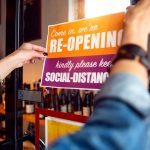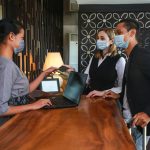Claiming that her employer prohibited her from wearing a face covering at work despite federal recommendations and local orders that such coverings should be worn by employees, a Texas cook just sued the restaurant that she says took her off the schedule after she objected to the company policy – and scored a victory in the first round of this fast-moving litigation. As the nation gets back to business under COVID-19’s “new normal,” workplace lawsuits stemming from COVID-19-related safety concerns are also part of the new normal. How can your business avoid similar claims from your employees as you open back up?
The Allegations
Jane Doe, a woman who prefers to remain unnamed for fear of retaliation by her employer, alleges that the Hillstone Restaurant Group prohibited her from wearing a face covering while working as a cook at R + D Kitchen, a Dallas-area restaurant. She claims that the restaurant informed her in April that it would be reopening for limited dine-in services. However, she alleges her managers told her that, unless she agreed to work without a face covering, she would be taken off the schedule. According to her complaint, Hillstone’s COVID-19 policy for its Texas restaurants indicates that: “masks are not required to be worn by guests or staff members… If you are concerned about your well-being with respect to masks not being worn by staff or by other guests, we hope you will join us at a later date.”
When she refused to work without a mask, Doe alleges that the restaurant took away her hours. She filed suit in a Texas federal court, alleging she was forced to choose between earning money to feed her family and violating the law and/or potential unprotected exposure to COVID-19. Her claim cites face mask recommendations by the Centers for Disease Control and Prevention (CDC) and the U.S. Food and Drug Administration (FDA), and an order by a Dallas County district court judge. She also cites to the state Labor Code and Occupational Safety and Health Act (OSH Act) standards in support of her claim that Hillstone Restaurant Group created a dangerous workplace for herself and other employees.
Court Sides With Worker In Early Stages Of Litigation
The Dallas County district court granted Doe’s request for a 14-day Temporary Restraining Order. This means that Hillstone Restaurant Group must allow Doe to wear a mask at work while she seeks a more permanent solution in court. The case was removed to federal court, only to be remanded back to Dallas County, for further consideration of her request for temporary and permanent injunctions against Hillstone Restaurant Group.
Guidance On Masks In The Workplace
In most situations, employers can refuse an employee’s request to wear a mask or respirator while at work. The CDC’s guidance, however, recommends wearing cloth face coverings in public settings where other social distancing measures are difficult to maintain, especially in areas of significant community-based transmission. This CDC guidance currently remains in effect.
The CDC recommends the use of simple cloth face coverings (not surgical masks or N-95 respirators) to slow the spread of the virus. Given this guidance, it is recommended that employers do not refuse an employee’s request to wear a mask or face covering while at work. If you do not require your employees to wear masks while at work, then you do not have to provide its employees with masks. Also, employers should take note of local orders which may require masks to be worn by employees at work, similar to the allegations in this lawsuit.
What Employers Should Do As Employees Return To Work
As you begin to welcome employees back to the workplace, you should expect safety concerns related to COVID-19 from your employees for some time. The best method to ensure that these employee concerns do not germinate into lawsuits is compliance with local, state, and federal guidance. Federal guidance includes CDC, FDA, and OSHA guidelines. The CDC released guidance to assist employers in making decisions regarding reopening their businesses. The CDC recommends employers implement health and safety actions before re-opening, including:
- Promoting healthy hygiene practices (i.e. hand washing and employees wearing a face covering while at work);
- Intensifying cleaning, disinfection, and ventilation of the workspace;
- Canceling non-essential travel, and encouraging alternative commuting and telework;
- Spatial changes to the workplace, including partitions, spacing out seating (more than six feet), and staggering gathering times;
- Restricting use of any shared items and spaces; and
- Training all employees in above safety-actions.
The CDC also recommends that employers only reopen after they have implemented safeguards for the ongoing monitoring of employees after reopening, including:
- Maintaining social distancing between employees;
- Encouraging employees who are sick to stay home;
- Establishing routine, daily employee health checks (i.e. temperature checks as employees enter the building);
- Monitoring absenteeism and maintaining flexible time off policies;
- Having an action plan if an employee gets COVID 19, including a strategy for communication of the infection to other employees;
- Creating and testing emergency communication channels for employees; and
- Establishing communication with state and local health authorities.
Under the OSH Act, employees are only entitled to refuse to work if they believe they are in imminent danger. Imminent danger is the threat of death or serious physical harm, or a reasonable expectation that toxic substances or other health hazards are present, and exposure to them will shorten life or cause substantial reduction in physical or mental functioning. Requiring employees to work with patients in a medical setting without Personal Protective Equipment (PPE) at this time, for example, may rise to this threshold.
Most work conditions in the United States, however, do not likely meet the elements required for an employee to refuse to work. You should follow guidance issued by the CDC and OSHA to ensure employees are not in imminent danger. This guidance is general, and you must determine when this unusual state exists in their own workplace before determining whether it is permissible for employees to refuse to work.
In the current environment, individual employees and unions could be quick to escalate employee safety grievances to litigation. The best defense in this fluid health related situation is strict compliance with all local, state, and federal guidelines (and written documentation of that compliance) as you open your business and return your employees to work. You should develop a safety program in advance of employees returning to the workplace. You should make employees aware of, and train them on, your new safety policies. Communication and flexibility will be key tools in countering employee fear in returning to work.
We will continue to monitor the developments in this litigation to report developments that may impact your practices as you navigate your employees’ return to work amidst COVID-19. Make sure you are subscribed to Fisher Phillips’ Alert System to get the most up-to-date information. For further information, contact your Fisher Phillips attorney, the author, or any member of our Post-Pandemic Strategy Group Roster. You can also review our FP BEYOND THE CURVE: Post-Pandemic Back-To-Business FAQs For Employers and our FP Resource Center For Employers for industry-specific guidance.
This Legal Alert provides an overview of a specific developing situation. It is not intended to be, and should not be construed as, legal advice for any particular fact situation.
AUTHORS
Alden J. Parker, Partner
Alden Parker is a member of the firm’s COVID-19 Taskforce, a cross-disciplinary team of attorneys dedicated to advising employers on the many workplace law aspects of the global coronavirus pandemic.
Alden Parker is the managing partner of the firm’s Sacramento office and the co-chair of the Hospitality Industry Group. Alden represents employers in all facets of employment law matters.
Megan Nevin, Associate
Megan Nevin is an attorney in Fisher Phillips’ Sacramento office. She represents employers in all aspects of labor and employment law, including claims of wage and hour violations, retaliation, wrongful termination, and discrimination.




Leave a Reply